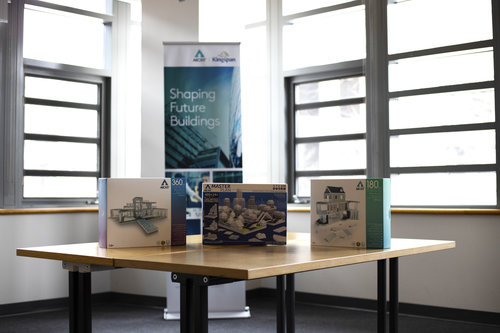Rotman Design challenge and Arckit
Rotman Design challenge and Arckit
INTRODUCTION

This past weekend, Rick Fairhurst was invited to the University of Toronto on behalf of ARCKIT to lead a hands-on design workshop for students at this year’s Rotman Design Challenge, sponsored by Kingspan. Meshing perfectly with the themes of resilience and digitized construction, the students enjoyed building and interacting with the ARCKIT platform.
It was an honour to demo ARCKIT alongside Kingspan and inspiring to see talented students pitch ideas revolving around the motifs of human relationships, communication, transparency and trust.
 |
 |
 |
THE COMPETITION
Hosted by the Business Design Club from the University of Toronto’s Rotman School of Management, The Rotman Design Challenge (RDC) is an annual, live, design thinking competition that provides students with an opportunity to not only get their ideas heard but, implemented. As the largest student-run international design case competition, RDC is quite a unique and ambitious endeavor. It attracts brilliant MBA students from top tier business/design schools around the globe to pitch and defend their take on an impactful business strategy solution toward a problem/question posed by a sponsor. In an action-packed couple weeks, teams are formed, a mentor is assigned, research is done, a proposal is drafted and a presentation is submitted.
 |
 |
With past sponsors such as Target, Steelcase and Fidelity Labs, this year Kingspan, a giant industry leader in architectural paneling systems, took center stage as over 150 students spread across 31 teams took a chance at pitching an answer to the posed question below…
“Within the next 5-10 years, how can Kingspan, the global leader in high-performance insulation and building envelope solutions, and a company committed to sustainability, disrupt its own business model to be the leader in the future of digital construction?”
After listening to the finalist’s presentations, we were awestruck at the diversity of the ideas presented. Each team brought an invaluable new perspective to the table with presentations ranging from an insulated block system to different cloud-hosted AI platforms that focused on personalized case-study databases, online material labs and tools to assess project robustness. It was a humbling experience to see each team stand up on stage and present their vision for how Kingspan and the construction/architecture industry as a whole could leverage digital tools and innovative strategies for transformation change. In the end, three teams took home cash prizes and all finalists were given the opportunity to communicate further with the Kingspan team.
THE ARCKIT WORKSHOP
During the initial judging rounds, Rick lead an ARCKIT workshop where students were able to join in to build their own modular units. If you haven’t used ARCKIT before, it is an incredible architectural modeling making tool that mimics modern, modular construction techniques. With a series of interconnecting parts, a simple/clean workflow and iterative abilities, it is the perfect tool to teach and prototype panelized construction with. Especially with Kingspan as the event sponsor, the workshop was an activity that fit quite well thematically, touching on topics such as modularity, cost and performance with panelized systems.
With almost all students coming from backgrounds outside of design and construction it was interesting to see how each approached ARCKIT for the first time. It was deeply rewarding to work with and watch each team mingle together and explain their visions for Kingspan while using the ARCKIT components. There was a resounding passion and a sense of urgency among the students for their proposals. Overall, it was a pleasure interacting with them and hearing their wishes and direction for a better future at the ARCKIT workshop. In the end, many of the student creations were stacked or linked together to create one large final structure highlighting the combined effort of everyone’s contributions to the weekend’s success.
 |
 |
 |
 |
 |
FINAL REMARKS
With many disciplines consistently being disrupted by digital technologies, the construction and design industries remain in much need of improvement, often slow and hesitant to adopt new methods buildings can be designed, constructed and operated. With such enormous industries that leave behind physical and tangible evidence, it is understandable for disruptive change to be slow to normalize and very methodical.
The problem is that our world is changing so rapidly that time has become of the essence. It is crucial that the industry keeps up to stay in line with customer need. It is estimated that over the next 30 years, several trillion square feet of new construction will be built. That is the equivalent of adding another Paris to the planet each week!

It was inspiring and refreshing to see a large company like Kingspan, with such a vast global infrastructure and network, not only acknowledge their own footprint but, take responsibility and sponsor an event, inciting the generations of tomorrow to think critically about solutions to the challenges of urbanization, climate change, and material/resource scarcity. Moving forward it will become increasingly important that our world digitizes and streamlines the industry so that working together is not only easier but, makes us more resilient. Many thanks to all that were involved in making the competition a success!
GALLERY
 |
 |
 |
 |
 |
 |
 |
 |
 |
ACKNOWLEDGEMENTS
A warm thank you to ARCKIT for the opportunity, to Kingspan for their support and generosity and RDC for hosting and planning this amazing event.
